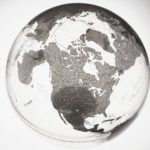
Section 2: Three Phases of Globalization
“Phase 1: The Early Voyages of Exploration & Colonization … Phase 2: The Age of Transnational Integration (1850-1914) … Phase 3: The Modern Age of Globalization (1945 to the present) … Discussion”
Summaries
- 2. Three Phases of Globalization > Phase 1: The Early Voyages of Exploration & Colonization > Lecture
- 2. Three Phases of Globalization > Phase 2: The Age of Transnational Integration (1850-1914) > Lecture
- 2. Three Phases of Globalization > Phase 3: The Modern Age of Globalization (1945 to the present) > Lecture
2. Three Phases of Globalization > Phase 1: The Early Voyages of Exploration & Colonization > Lecture
- Phase one begins in 1492, with the voyage of Christopher Columbus to the new world, and continues with later European voyages of exploration that eventually made possible the formation of Europe’s colonial empires.
- Who were these explorers, and why were their voyages unlike passages across oceans that were made during the prehistoric period, true forerunners of what we call globalization? The Italian explorer Christopher Columbus, financed by the Spanish crown, completed four voyages across the Atlantic Ocean that created a European awareness of the North and South American continents.
- Sir Francis Drake achieved the second circumnavigation of the Earth in the late 16th century, and played the role of a global buccaneer, carrying out attacks and confiscating foreign treasures around world.
- Second, they carried out state-sponsored expeditions to confiscate wealth that could become the property of the state, thereby anticipating future alliances between states and private companies.
- The monopoly of trade granted to the East India Company by Queen Elizabeth I in 1600 is a prime example of the state-corporate partnership that today takes the form of the state capitalism practiced on the larger scale by China, and by many other countries.
- State-controlled companies are thriving and have enormous influence in emerging economies, such as those of China, Brazil, and India.
2. Three Phases of Globalization > Phase 2: The Age of Transnational Integration (1850-1914) > Lecture
- The second phase of globalization covers the period of intensive internationalization of transportation systems, communications, commerce, science, and many other human activities that unfolded between the middle of the 19th century and the collapse of second phase globalization that resulted from the outbreak of war in August of 1914.
- During the second half of the 19th century, the Western world experienced a dramatic intensification of international connectivity due to four advancing technologies- trains, steamships, the telegraph, and the postal system.
- The period 1880 to 1914 saw a level of global economic integration that matched or even exceeded that of the global economy today.
- The investment capital that flowed around the world, much of it originating in London, contributed to the economic development of the former colonies of the global British Empire- the United States, Canada, Australia, and New Zealand.
- Small and remote British possessions around the world, such as the Cayman Islands, the Bahamas, and Hong Kong, would eventually turn into so-called offshore tax havens, serving a global economic elite.
- The oppression and exploitation of colonized populations has always been an integral part of the global system.
- At the turn of the 20th century, an affluent inhabitant of London had access to many products of foreign origin years before the fateful events of August 1914 profoundly disrupted this world of unprecedented global connectivity.
- We may call these organizations and their global campaigns or movements the idealistic internationalisms.
- The professed internationalist and openly racist Lord Baden-Powell established the Scouting Movement in 1908.
- Having demonstrated their usefulness, or at least their widespread appeal to the global community, these global organizations testify to the enduring stature of venerable movements that have always claimed to represent the highest aspirations of mankind.
2. Three Phases of Globalization > Phase 3: The Modern Age of Globalization (1945 to the present) > Lecture
- New global economic reforms agreed upon by the United States and its wartime allies in 1944 provided a new framework for international commerce and finance.
- The political implications of this new global economic order were and remain profound.
- New international financial agreements and institutions, such as the International Monetary Fund and the World Bank, provided a new kind of global financial stability.
- Finally, this new global economic arrangement made possible the expansion of the welfare state and the protections it provides to the economically vulnerable as well as to more financially secure citizens who may face illness or unemployment.
- The expansion of the welfare state has been made possible by government regulation that created a balance of power between governments, large corporations, and the financial sector.
- It has been succeeded by slower growth and a series of global financial crises related to the triumph of neoliberal market globalism.
- This political and economic arrangement is based upon a deregulation of the corporate sector, the privatization of public enterprises and institutions, tax reductions for businesses and individuals, the setting of limits on the powers of labor unions, reducing the role of government in the formulation of social policies, and deregulating capital flows in the new global investment markets.
- These developments have coincided with the flourishing of unregulated offshore financial institutions and shell company strategies, some of them legal, others illegal, they have facilitated massive tax evasion by the rich and embezzlement from the poor.
- The United Nations embodies hopes for effective global governance and regulations that remain largely unfulfilled.
- NGOs are modern examples of idealistic internationalism, and their missions remind us that today’s globalization can be defined to include global responsibilities to poor and vulnerable people as well as to the endangered planet we all inhabit.



